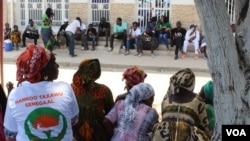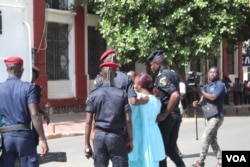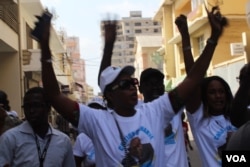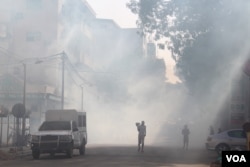Senegal is wrapping up a heated campaign season ahead of Sunday’s legislative polls.
Tear gas filled the air in Dakar’s city center this week as police dispersed an opposition demonstration called by former president Abdoulaye Wade to denounce the organization of the upcoming election.
Wade’s return to the country to lead the main opposition coalition has been just one spark raising the temperature during this campaign period.
Another key political figure, the mayor of Dakar, is leading his "Manko Taxanu Senegal" coalition from prison. Khalifa Sall was arrested in March and charged with embezzling public funds. He demanded temporary release during the campaign period, but his request was rejected by the Supreme Court.
Supporters waited for the verdict outside the court. Mama Gueye, a coordinator for Ande Dollel Khalifa, a political movement supporting the mayor, was among them.
She said the verdict will not affect the "Manko" campaign. “We will continue the battle until he is released,” she said. “Our objective is to see him live and become the next president in 2019.”
There are 165 seats to be filled in the National Assembly, and voters on Sunday will choose from a record 47 lists, casting their ballots by party rather than for individual candidates.
Many see the vote as a sort of referendum on the current government of President Macky Sall and a preview of his potential challengers for the top job in 2019, although analysts say it is unlikely the ruling party will lose its majority in parliament.
There has been some violence during campaigning.
In and around Dakar, supporters of Sall’s ‘Manko’ coalition have clashed several times with members of the president’s Benno Bokk Yaakaar coalition, which is led by the current prime minister.
Senegalese political analyst Aly Fary Ndiaye says the mayor’s coalition has made his continued detention work for them.
“It is a tactic to put pressure on the government,” he said, “to question the independence of the justice system and remind Senegalese citizens of the injustice [they say] Khalifa Sall is suffering,” Ndiaye said.
New ID card system
Meanwhile, former president Wade has joined civil society groups in condemning delays in the introduction of new biometric identity cards. The new ID cards were officially launched by the government in October last year, and also are meant to function as voting cards.
Sadikh Niass, Secretary-General of the NGO African Assembly for the Defense of Human Rights, says there have been delays in getting the cards out to voters, adding that as of July 19, many voting cards had yet to be printed. He also said those that have been issued are not reaching voters because the distribution system is poorly organized.
His organization estimated that with three weeks to go before the vote, only about 40 percent of voters had collected their cards.
Presidential spokesman Hamidou Kasse told VOA the situation is not as bad as reported.
“In distribution centers there are hundreds of thousands of cards waiting for their owners. In Senegal, we have the habit of waiting until the last minute before collecting our cards,” Kasse said.
On Thursday, local media reported that the Constitutional Court approved a request from the presidency to allow citizens without new biometric cards to vote using other forms of identification.
Legislative elections in Senegal typically do not witness high voter turnout. But with all the excitement during campaigning, this time could be different.
Still, Abdou El Mazide Ndiaye president of Gradec, a research group promoting democracy and good governance in Africa, says the anticipation of long lines could still be a turn-off.
“Lines at the polls will be long because there are 47 lists. People will be completely discouraged by the wait,” said Mazide.
That’s almost double the number of lists that voters had to choose from during the last legislative elections in 2012, and there are concerns it could lead to some confusion at the polls Sunday.







